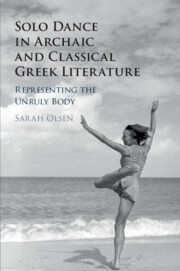Book contents
- Solo Dance in Archaic and Classical Greek Literature
- Solo Dance in Archaic and Classical Greek Literature
- Copyright page
- Dedication
- Contents
- Figures
- Acknowledgments
- Notes on Texts, Abbreviations, and Style
- Introduction
- Chapter 1 The Fantastic Phaeacians
- Chapter 2 Io’s Dance
- Chapter 3 Dance at Work
- Chapter 4 Dance and Dissonance
- Chapter 5 Staging Madwomen
- Chapter 6 Agency, Narrative, and the Dancing Girl
- Chapter 7 Dance History
- Conclusion
- Bibliography
- Index Locorum
- General Index
Chapter 2 - Io’s Dance
Human Mobility and Divine Authority in Aeschylus’ Prometheus Bound
Published online by Cambridge University Press: 30 November 2020
- Solo Dance in Archaic and Classical Greek Literature
- Solo Dance in Archaic and Classical Greek Literature
- Copyright page
- Dedication
- Contents
- Figures
- Acknowledgments
- Notes on Texts, Abbreviations, and Style
- Introduction
- Chapter 1 The Fantastic Phaeacians
- Chapter 2 Io’s Dance
- Chapter 3 Dance at Work
- Chapter 4 Dance and Dissonance
- Chapter 5 Staging Madwomen
- Chapter 6 Agency, Narrative, and the Dancing Girl
- Chapter 7 Dance History
- Conclusion
- Bibliography
- Index Locorum
- General Index
Summary
Chapter Two is the first of four chapters on Athenian drama, and it takes as its focal point Aeschylus’ Prometheus Bound. In this chapter, I observe that the representation of the maiden Io as a wild and erratic dancer engages with images of female choreia and the precarious position of the outstanding maiden soloist that originate in Archaic poetry but develop a special force within Athenian tragedy. Building on arguments developed in Chapter One, I explore how the image of the maiden chorus creates space for the female soloist to relate positively to her choral group, and then demonstrate that Io disrupts that paradigm by appearing utterly unmoored from any sense of chorality. I argue that Io embodies the play’s vision of mortal life and offers an image of resistance to the authority of Zeus distinct from the static suffering of Prometheus himself – a resistance that is grounded in the twin forces of mobility and maternity.
- Type
- Chapter
- Information
- Solo Dance in Archaic and Classical Greek LiteratureRepresenting the Unruly Body, pp. 52 - 72Publisher: Cambridge University PressPrint publication year: 2020

